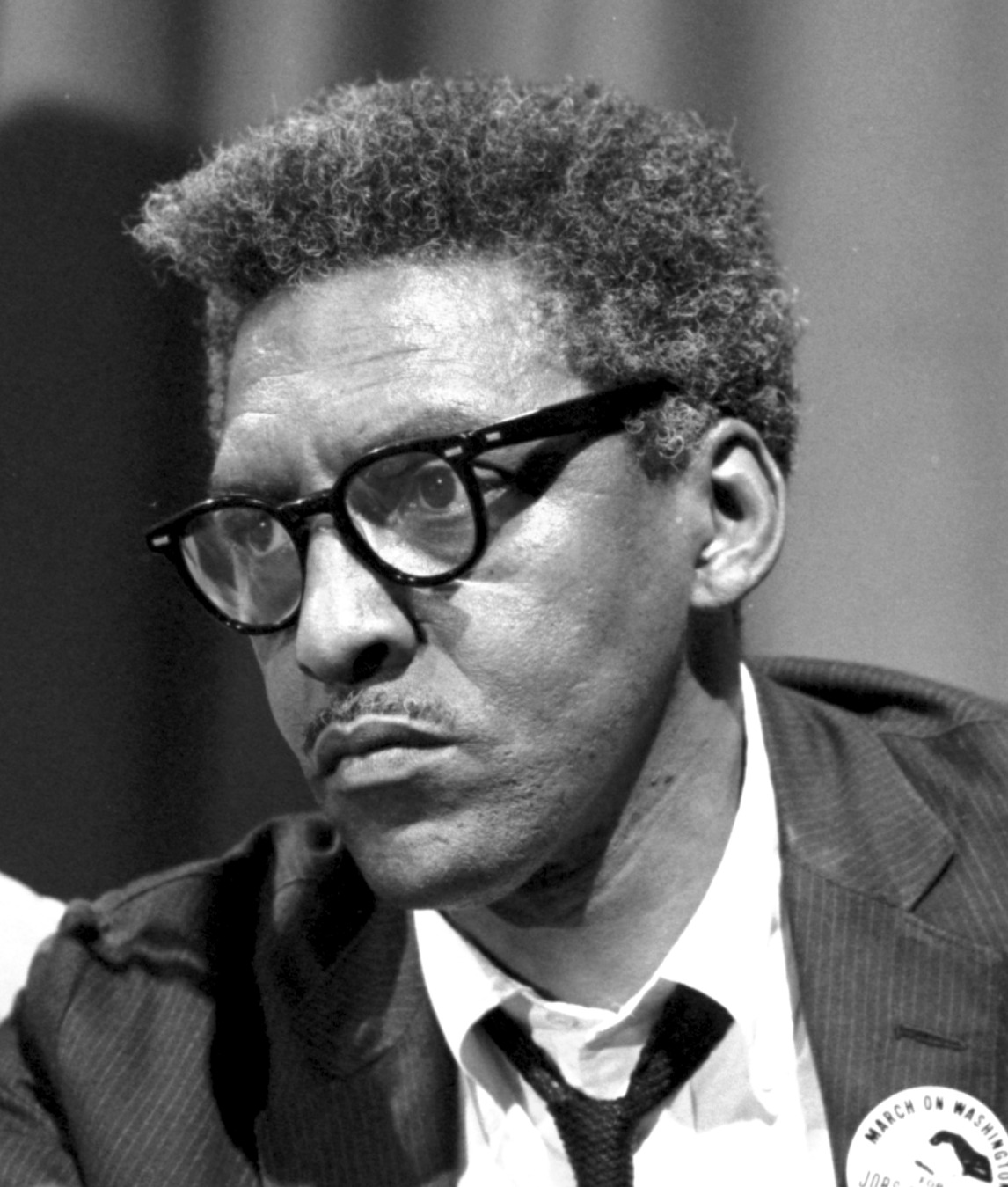
Bayard Rustin
Bayard Rustin (/ˈbaɪ.ərd/ BY-ərd; March 17, 1912 – August 24, 1987) was an American political activist, a prominent leader in social movements for civil rights, socialism, nonviolence, and gay rights. Rustin was the principal organizer of the March on Washington for Jobs and Freedom in 1963.[1]
Bayard Rustin
March 17, 1912
August 24, 1987 (aged 75)
Davis Platt (1940s)
Walter Naegle (1977–1987; Rustin's death)
Rustin worked in 1941 with A. Philip Randolph on the March on Washington Movement to press for an end to racial discrimination in the military and defense employment. Rustin later organized Freedom Rides, and helped to organize the Southern Christian Leadership Conference to strengthen Martin Luther King Jr.'s leadership; he taught King about non-violence. Rustin worked alongside Ella Baker, a co-director of the Crusade for Citizenship, in 1954; and before the Montgomery bus boycott, he helped organize a group called "In Friendship" to provide material and legal assistance to people threatened with eviction from their tenant farms and homes.[2] Rustin became the head of the AFL–CIO's A. Philip Randolph Institute, which promoted the integration of formerly all-white unions and promoted the unionization of African Americans. During the 1970s and 1980s, Rustin served on many humanitarian missions, such as aiding refugees from Vietnam and Cambodia.
Rustin was a gay man and, due to criticism over his sexuality, usually advised other civil rights leaders from behind the scenes. During the 1980s, he became a public advocate on behalf of gay causes, speaking at events as an activist and supporter of human rights.[3]
Later in life, while still devoted to securing workers' rights, Rustin joined other union leaders in aligning with ideological neoconservatism,[4][5] earning posthumous praise from President Ronald Reagan.[6] On November 20, 2013, President Barack Obama posthumously awarded Rustin the Presidential Medal of Freedom.[7]
Early life and education[edit]
Rustin was born in 1912 in West Chester, Pennsylvania, to Florence Rustin and Archie Hopkins, but raised by his maternal grandparents, Julia (Davis) and Janifer Rustin, as the ninth of their twelve children; growing up he believed his biological mother was his older sister.[8][9][10] His grandparents were relatively wealthy local caterers who raised Rustin in a large house.[8] Julia Rustin was a Quaker, although she attended her husband's African Methodist Episcopal Church. She was also a member of the National Association for the Advancement of Colored People (NAACP). NAACP leaders such as W.E.B. Du Bois and James Weldon Johnson were frequent guests in the Rustin home. With these influences in his early life, in his youth Rustin campaigned against racially discriminatory Jim Crow laws.[11]
One of the first documented realizations Rustin had of his sexuality was when he mentioned to his grandmother that he preferred to spend time with males rather than females. She responded, "I suppose that's what you need to do".[12]
In 1932, Rustin entered Wilberforce College, a historically black college in Ohio operated by the AME Church.[13] Rustin was active in a number of campus organizations, including the Omega Psi Phi fraternity.[14] He was expelled from Wilberforce in 1936 after organizing a strike,[15] and later attended Cheyney State Teachers College (now Cheyney University of Pennsylvania). Cheyney honored Rustin with a posthumous Doctor of Humane Letters degree at its 2013 commencement.
After completing an activist training program conducted by the American Friends Service Committee (AFSC), Rustin moved to Harlem in 1937 and began studying at City College of New York. There he became involved in efforts to defend and free the Scottsboro Boys, nine young black men in Alabama who were accused of raping two white women. He joined the Young Communist League in 1936, and left in 1941 after the Communist Party USA reversed its anti-war policy in response to Nazi Germany's invasion of the USSR. This conflicted with Rustin's anti-war stance.[16] Soon after arriving in New York City, he became a member of Fifteenth Street Meeting of the Religious Society of Friends (Quakers).
Rustin was an accomplished tenor vocalist, an asset that earned him admission to both Wilberforce University and Cheyney State Teachers College with music scholarships.[17] In 1939, he was in the chorus of the short-lived Broadway musical John Henry that starred Paul Robeson. Blues singer Josh White was also a cast member and later invited Rustin to join his gospel and vocal harmony group Josh White and the Carolinians, with whom he made several recordings. With this opportunity, Rustin became a regular performer at the Café Society nightclub in Greenwich Village, widening his social and intellectual contacts.[18] A few albums on Fellowship Records featuring his singing, such as Bayard Rustin Sings a Program of Spirituals, were produced from the 1950s through the 1970s.